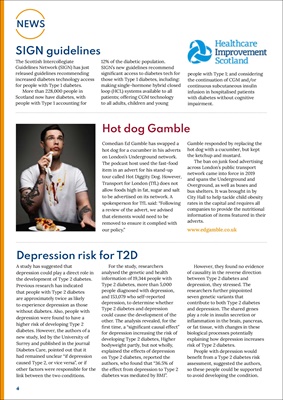
4
NEWS
SIGN guidelines
The Scottish Intercollegiate
Guidelines Network (SIGN) has just
released guidelines recommending
increased diabetes technology access
for people with Type 1 diabetes.
More than 228,000 people in
Scotland now have diabetes, with
people with Type 1 accounting for
12% of the diabetic population.
SIGN's new guidelines recommend
significant access to diabetes tech for
those with Type 1 diabetes, including:
making single-hormone hybrid closed
loop (HCL) systems available to all
patients; offering CGM technology
to all adults, children and young
Hot dog Gamble
Comedian Ed Gamble has swapped a
hot dog for a cucumber in his adverts
on London's Underground network.
The podcast host used the fast-food
item in an advert for his stand-up
tour called Hot Diggity Dog. However,
Transport for London (TfL) does not
allow foods high in fat, sugar and salt
to be advertised on its network. A
spokesperson for TfL said: "Following
a review of the advert, we advised
that elements would need to be
removed to ensure it complied with
our policy."
Gamble responded by replacing the
hot dog with a cucumber, but kept
the ketchup and mustard.
The ban on junk food advertising
across London's public transport
network came into force in 2019
and spans the Underground and
Overground, as well as buses and
bus shelters. It was brought in by
City Hall to help tackle child obesity
rates in the capital and requires all
companies to provide the nutritional
information of items featured in their
adverts.
www.edgamble.co.uk
Depression risk for T2D
A study has suggested that
depression could play a direct role in
the development of Type 2 diabetes.
Previous research has indicated
that people with Type 2 diabetes
are approximately twice as likely
to experience depression as those
without diabetes. Also, people with
depression were found to have a
higher risk of developing Type 2
diabetes. However, the authors of a
new study, led by the University of
Surrey and published in the journal
Diabetes Care, pointed out that it
had remained unclear "if depression
caused Type 2, or vice versa", or if
other factors were responsible for the
link between the two conditions.
For the study, researchers
analysed the genetic and health
information of 19,344 people with
Type 2 diabetes, more than 5,000
people diagnosed with depression,
and 153,079 who self-reported
depression, to determine whether
Type 2 diabetes and depression
could cause the development of the
other. The analysis revealed, for the
first time, a "significant causal effect"
for depression increasing the risk of
developing Type 2 diabetes, Higher
bodyweight partly, but not wholly,
explained the effects of depression
on Type 2 diabetes, reported the
authors, who found that "36.5% of
the effect from depression to Type 2
diabetes was mediated by BMI".
However, they found no evidence
of causality in the reverse direction
between Type 2 diabetes and
depression, they stressed. The
researchers further pinpointed
seven genetic variants that
contribute to both Type 2 diabetes
and depression. The shared genes
play a role in insulin secretion or
inflammation in the brain, pancreas,
or fat tissue, with changes in these
biological processes potentially
explaining how depression increases
risk of Type 2 diabetes.
People with depression would
benefit from a Type 2 diabetes risk
assessment, suggested the authors,
so these people could be supported
to avoid developing the condition.
people with Type 1; and considering
the continuation of CGM and/or
continuous subcutaneous insulin
infusion in hospitalised patients
with diabetes without cognitive
impairment.